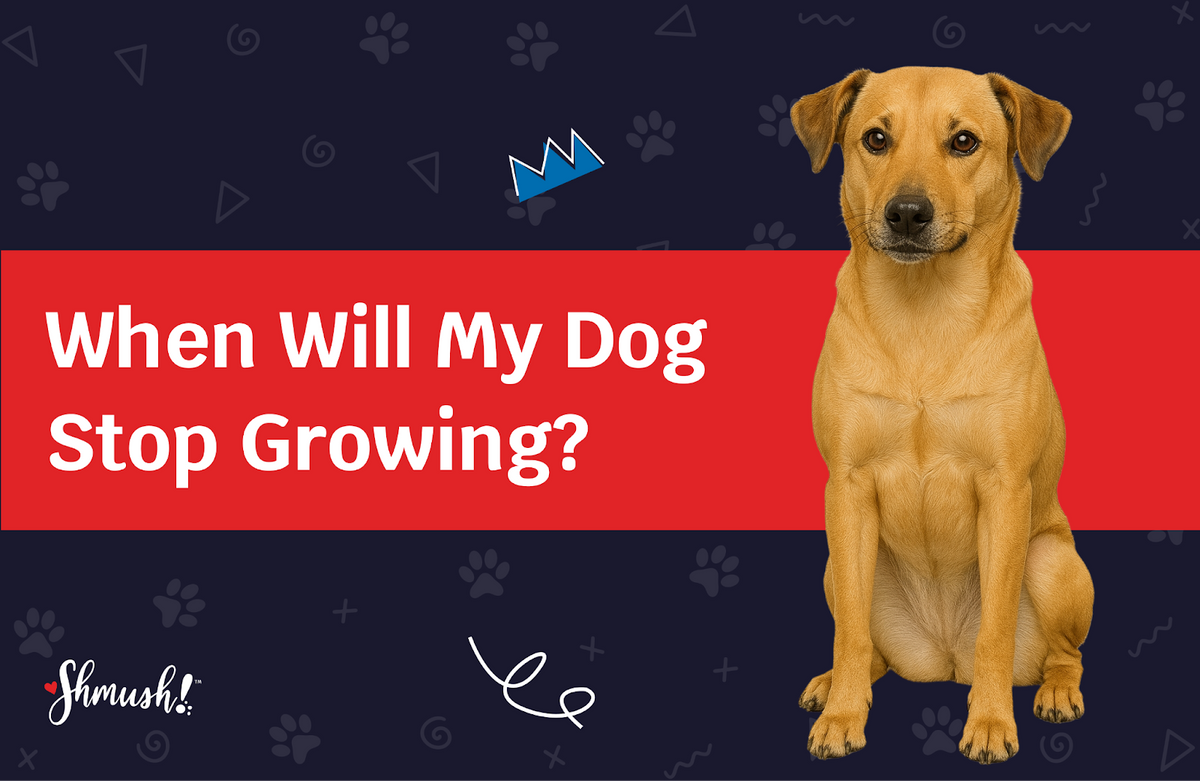

Raising a puppy is an exciting journey, filled with playful moments and milestones as they grow from tiny, wobbly balls of fur into full-grown dogs. As a pet owner, you might wonder when your puppy will finally stop growing and settle into their adult size.
Every dog grows at its own pace, but there are key stages that can help you understand their growth. In this blog post, we’ll go over the stages of dog growth and the factors that impact their size.
Understanding how your dog grows will help you better prepare to meet its nutritional and exercise needs throughout its development.
How do Puppies Grow?
Puppy growth happens in spurts, with periods of rest in between. During these growth phases, your dog’s bones undergo significant changes. Their long bones, like those in the hind and front legs, contain growth plates made of cartilage. This cartilage is where new bone tissue is added, allowing their bones to lengthen and grow.
The growth plates are crucial during your dog’s early development, as they provide the flexibility needed for bone expansion. As your puppy matures, their bones will gradually stop growing once the growth plates “close,” or calcify into solid bone. This typically happens around the age of one year, though the exact timing can vary depending on the breed and size of the dog.
After this point, their bones are fully developed, and while they may continue to gain muscle and fat, they won't grow taller or longer. With that in mind, let’s dive into the details of their developmental stages.
Developmental Stages of Puppies
Puppies go through a series of developmental stages, each with distinct milestones that shape their physical and behavioral growth. Knowing the duration of each stage helps you manage their care and set expectations as they mature.
The following table provides an overview of the main developmental stages of puppies and how long each phase typically lasts:
| Stage | Duration |
|---|---|
| Neonatal Stage | 0–2 weeks |
| Transitional Stage | 2–4 weeks |
| Socialization Stage | 4–12 weeks |
| Juvenile Stage | 3–6 months |
| Adolescence | 6–18 months |
| Adulthood | 18 months–2 years |
Now that you have an overview of the key stages, here’s a closer look at what happens during each phase of your puppy’s growth and how these stages shape their behavior and needs.
1. Neonatal Stage
This is the stage when puppies are completely dependent on their mother. They can’t see or hear, and their main activities are eating and sleeping. During this time, they rely on their mom for warmth, nourishment, and care.
2. Transitional Stage
At this stage, puppies begin to open their eyes and ears. They start to become more aware of their surroundings and begin to explore, though they’re still mainly focused on nursing and sleeping. Their senses are developing, and they begin to show more movement and curiosity.
3. Socialization Stage
This is one of the most crucial periods for puppy development. Puppies start interacting with their littermates, mother, and humans. Socialization at this stage helps them become comfortable with various environments, people, and other pets. This is also the time when early training and learning begin, and they develop important behavioral traits.
4. Juvenile Stage
During this stage, puppies grow quickly, and their energy levels peak. This is when their personalities begin to shine through, and you may notice behavioral changes such as increased independence or occasional rebelliousness. They also start losing their baby teeth and growing their adult teeth during this time.
5. Adolescence
Puppies go through a "teenager" phase, where their growth slows down but their hormones start to kick in. You may notice changes in their behavior, like testing boundaries or becoming more independent. Training can become more challenging during this stage, but it’s crucial to continue reinforcing positive behaviors as they transition into adulthood.
6. Adulthood
By the time your dog reaches this stage, they should be physically mature. Depending on the breed, they may still have some growing to do, especially in terms of muscle development. But by the end of this period, most dogs will have reached their full adult size and weight.
As your puppy progresses through various developmental stages, understanding their growth pattern becomes essential for providing the right care. Now, let’s explore how different dog breeds grow and when you can expect them to reach their full size.
Growth Patterns by Dog Breed
Every puppy grows at its own pace, but breed size plays a significant role in determining when they’ll stop growing and how large they’ll become. Understanding these growth patterns can help you set realistic expectations for your puppy’s development and ensure they’re getting the appropriate care.
The table below breaks down the growth timelines and size expectations for different dog breeds.
| Breed Size | Examples | Growth Stops (Months) | Average Weight (Adult) | Life Expectancy |
|---|---|---|---|---|
| Small Breeds | Chihuahua, Dachshund, Toy Poodle | 6-12 | 5-20 lbs | 12-16 years |
| Medium Breeds | Beagle, Bulldog, Cocker Spaniel | 12-18 | 20-50 lbs | 10-14 years |
| Large Breeds | Golden Retriever, Labrador Retriever, Boxer | 18-24 | 50-100 lbs | 8-12 years |
Factors Influencing Puppy Growth
Several factors come into play when it comes to your puppy’s growth and development. Understanding these influences can help you better care for your puppy as they mature.
-
Nutrition: Proper nutrition is key to healthy growth. A balanced diet with the right nutrients supports bone and muscle development. Consider adding Shmush Pets’ Vitamin Health Biscuits to your puppy's diet for extra vitamins and minerals that promote overall growth and wellness.
-
Health: Your puppy’s overall health significantly affects their growth rate. Regular vet visits help ensure that your puppy is growing as expected and allow for early detection of any health issues. Keeping your puppy healthy through good care and preventive check-ups is key to steady, healthy growth.
-
Gender: Male puppies generally grow larger and may take longer to mature compared to females. This difference is often seen in larger breeds, where males can continue growing longer before reaching full maturity. Females, on the other hand, usually mature faster and reach their adult size earlier.
-
Genetics: Genetics play a major role in determining your puppy's size and growth rate. The size of their parents is often a good predictor of their final size, although individual variation can occur. Puppies inherit genetic traits from both their mother and father, which influences everything from bone structure to muscle mass.
-
Spaying/Neutering: The timing of spaying or neutering can affect your puppy’s growth. Early spaying or neutering before the age of 6 months can delay the closure of growth plates, causing some dogs to grow slightly taller. After the growth plates close, usually around one year, their bones stop growing, but their muscle and fat development continue.
As you focus on your puppy’s growth, one of the most important factors to consider is their nutrition. The right diet ensures they develop properly and reach their full potential in size and strength.
How to Feed Your Puppy for Healthy Growth
Proper nutrition is essential for supporting your puppy’s growth and development during their early stages. A diet rich in high-quality protein, healthy fats, and essential minerals ensures they develop strong muscles, bones, and energy levels.
-
High-quality protein: A protein-rich diet provides the building blocks for muscle development and overall health. It helps support healthy organ function and allows your puppy to grow strong. Look for puppy food that contains animal-based proteins like
-
Chicken
-
Beef
-
Lamb
-
Healthy fats: Fats are a vital energy source and aid in the absorption of fat-soluble vitamins like A, D, E, and K. They support brain development, coat health, and overall immune function. Look for foods that include omega-3 and omega-6 fatty acids to promote a shiny coat and a strong immune system.
-
Minerals and vitamins: Puppies also need minerals like
-
calcium
-
phosphorus
-
Magnesium
These minerals help with bone density and prevent developmental issues related to weak bones. Vitamins such as vitamin D are also important for the absorption of calcium, promoting bone health and growth.
Proper feeding is key to ensuring your puppy reaches their full growth potential. Consistent, balanced meals provide the right nutrients for their bones, muscles, and overall health, helping prevent stunted growth or malnutrition. As your puppy grows, exercise is just as important as nutrition for their development.
Exercise Guidelines for Growing Puppies
Puppies are full of energy, but their bodies are still developing, so overexertion can be harmful.
-
Ensure regular play without overexertion: Playtime is key to your puppy’s growth, but be mindful not to push them too hard.
Short, frequent sessions of play and exploration help build strength and stamina.
Avoid long, intense exercises that could strain their growing muscles or joints. -
Focus on gentle activities that support physical development: Activities like leash walking and gentle fetch are great ways to engage your puppy without risking injury.
Socialization is also crucial at any stage, so allow your puppy to interact with other dog friends and people.
These experiences help your puppy develop their social skills and confidence, setting them up for a well-rounded, happy adulthood.
Wrapping up
Supporting your puppy through each stage of growth is essential for ensuring it matures into a strong, healthy adult. By understanding its unique growth path, including the right nutrition, exercise, and care, you can help your dog reach its full potential. Every puppy grows at its own pace, influenced by a variety of factors, so it’s important to adjust its care accordingly.
For an extra boost to your puppy's development, try Shmush Pets’ AM and PM Biscuits. Our two unique formulas work together to support your puppy's health around the clock. The breakfast Biscuits are packed with powerful antioxidants to fight free radicals and help boost energy during the day.
Also, the bedtime biscuits work to enhance immunity overnight, ensuring your puppy stays strong and healthy while they rest. Give your furry friend the best chance for a long, vibrant life! Check out Shmush Pets’ vitamin health biscuits today!

Free Pet Longevity Playbook
Expert tips for helping your dog live a longer, healthier life—delivered straight to your inbox.